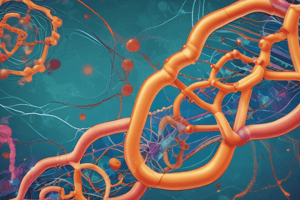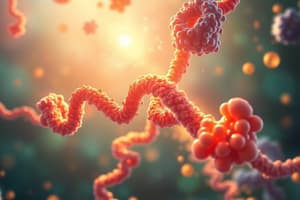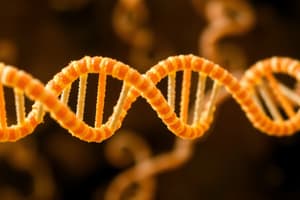Podcast
Questions and Answers
What is the synthesis of RNA under the direction of DNA?
What is the synthesis of RNA under the direction of DNA?
transcription
What is the synthesis of a polypeptide, which occurs under the direction of mRNA?
What is the synthesis of a polypeptide, which occurs under the direction of mRNA?
translation
In prokaryotes, mRNA produced by transcription is ____ ____.
In prokaryotes, mRNA produced by transcription is ____ ____.
immediately translated
What separates transcription and translation in a eukaryotic cell?
What separates transcription and translation in a eukaryotic cell?
Transcription produces ____.
Transcription produces ____.
Where is the site of translation?
Where is the site of translation?
What modifies eukaryotic RNA transcripts to yield finished mRNA?
What modifies eukaryotic RNA transcripts to yield finished mRNA?
What is the initial RNA transcript from any gene?
What is the initial RNA transcript from any gene?
What is the order of the cellular chain of command? 1.; 2.; 3._____
What is the order of the cellular chain of command? 1.; 2.; 3._____
What are the smallest units of uniform length that can code for all amino acids?
What are the smallest units of uniform length that can code for all amino acids?
What is the term for one of the two strands that provides a template for ordering the sequence of nucleotides in an RNA transcript?
What is the term for one of the two strands that provides a template for ordering the sequence of nucleotides in an RNA transcript?
What are the mRNA base triplets called during translation?
What are the mRNA base triplets called during translation?
Each codon specifies the ____ ____ to be placed at the corresponding ____ along a ____.
Each codon specifies the ____ ____ to be placed at the corresponding ____ along a ____.
Codons must be read in the correct ____ ____ in order for the specified polypeptide to be produced.
Codons must be read in the correct ____ ____ in order for the specified polypeptide to be produced.
RNA synthesis is catalyzed by ____ ____.
RNA synthesis is catalyzed by ____ ____.
The DNA sequence where RNA polymerase attaches.
The DNA sequence where RNA polymerase attaches.
The sequence signaling the end of transcription.
The sequence signaling the end of transcription.
The stretch of DNA transcribed.
The stretch of DNA transcribed.
What are the three stages of transcription? 1., 2., 3.____
What are the three stages of transcription? 1., 2., 3.____
What signals the initiation of RNA synthesis?
What signals the initiation of RNA synthesis?
What mediates the binding of RNA polymerase and the initiation of transcription?
What mediates the binding of RNA polymerase and the initiation of transcription?
The completed assembly of transcription factors and RNA polymerase II bound to a promoter is called a ____ ____ ____.
The completed assembly of transcription factors and RNA polymerase II bound to a promoter is called a ____ ____ ____.
As RNA polymerase moves along the DNA it untwists the double helix, ____ to ____ ____ at a time.
As RNA polymerase moves along the DNA it untwists the double helix, ____ to ____ ____ at a time.
In eukaryotes, transcription progresses at a rate of ____ ____ per ____.
In eukaryotes, transcription progresses at a rate of ____ ____ per ____.
In bacteria, the polymerase stops transcription at the ____ of the ____.
In bacteria, the polymerase stops transcription at the ____ of the ____.
In eukaryotes, the polymerase continues transcription until after the -_ is cleaved from the growing ____ ____. The polymerase eventually ____ ____ the DNA.
In eukaryotes, the polymerase continues transcription until after the -_ is cleaved from the growing ____ ____. The polymerase eventually ____ ____ the DNA.
Each end of a pre-mRNA molecule is modified in a particular way. The 5' end receives a modified ____ ____, while the 3' end gets a ____ ____.
Each end of a pre-mRNA molecule is modified in a particular way. The 5' end receives a modified ____ ____, while the 3' end gets a ____ ____.
The modifications of each end of a pre-mRNA molecule share several functions: 1., to ____ the export of mRNA; 2., to protect mRNA from ____ ____; 3., to help ribosomes ____ to the 5' end.
The modifications of each end of a pre-mRNA molecule share several functions: 1., to ____ the export of mRNA; 2., to protect mRNA from ____ ____; 3., to help ribosomes ____ to the 5' end.
What are the noncoding regions of nucleotides lying between the coding regions in eukaryotic genes?
What are the noncoding regions of nucleotides lying between the coding regions in eukaryotic genes?
Regions not lying in the noncoding regions of eukaryotic genes are called ____ because they are eventually expressed.
Regions not lying in the noncoding regions of eukaryotic genes are called ____ because they are eventually expressed.
What are exons usually translated into?
What are exons usually translated into?
What is the term for removing introns and joining exons, creating an mRNA molecule with a continuous coding sequence?
What is the term for removing introns and joining exons, creating an mRNA molecule with a continuous coding sequence?
What consists of a variety of proteins and several small nuclear ribonucleoproteins (snRNPs) that recognize the splice sites?
What consists of a variety of proteins and several small nuclear ribonucleoproteins (snRNPs) that recognize the splice sites?
What are catalytic RNA molecules that function as enzymes and can splice RNA?
What are catalytic RNA molecules that function as enzymes and can splice RNA?
Flashcards
Transcription
Transcription
The process of creating RNA from a DNA template.
Translation
Translation
The process of synthesizing a polypeptide chain from an mRNA template.
Coupled transcription & translation
Coupled transcription & translation
In prokaryotes, transcription and translation occur simultaneously in the cytoplasm.
RNA processing
RNA processing
Signup and view all the flashcards
Primary transcript
Primary transcript
Signup and view all the flashcards
Codon
Codon
Signup and view all the flashcards
Promoter region
Promoter region
Signup and view all the flashcards
5' cap
5' cap
Signup and view all the flashcards
Poly-A tail
Poly-A tail
Signup and view all the flashcards
Introns
Introns
Signup and view all the flashcards
Exons
Exons
Signup and view all the flashcards
RNA splicing
RNA splicing
Signup and view all the flashcards
Spliceosome
Spliceosome
Signup and view all the flashcards
Ribozymes
Ribozymes
Signup and view all the flashcards
Template strand
Template strand
Signup and view all the flashcards
Triplet code
Triplet code
Signup and view all the flashcards
Reading frame
Reading frame
Signup and view all the flashcards
Transcription rate (eukaryotes)
Transcription rate (eukaryotes)
Signup and view all the flashcards
Terminator sequence (bacteria)
Terminator sequence (bacteria)
Signup and view all the flashcards
Transcription elongation (eukaryotes)
Transcription elongation (eukaryotes)
Signup and view all the flashcards
Ribosomes
Ribosomes
Signup and view all the flashcards
Central dogma
Central dogma
Signup and view all the flashcards
tRNA
tRNA
Signup and view all the flashcards
Anticodon
Anticodon
Signup and view all the flashcards
Translation complex
Translation complex
Signup and view all the flashcards
Polypeptide sequence
Polypeptide sequence
Signup and view all the flashcards
Alternative splicing
Alternative splicing
Signup and view all the flashcards
Protein synthesis
Protein synthesis
Signup and view all the flashcards
Protein folding
Protein folding
Signup and view all the flashcards
Translation initiation
Translation initiation
Signup and view all the flashcards
Translation elongation
Translation elongation
Signup and view all the flashcards
Translation termination
Translation termination
Signup and view all the flashcards
Study Notes
Transcription and Translation Overview
- Transcription is the process of synthesizing RNA from DNA.
- Translation is the synthesis of polypeptides under the direction of mRNA.
Key Processes in Prokaryotes and Eukaryotes
- In prokaryotes, mRNA produced by transcription is immediately translated.
- Eukaryotic transcription and translation are separated by the nuclear envelope.
Transcription Details
- Transcription produces mRNA, the primary transcript.
- The process of transcription involves three stages: initiation, elongation, and termination.
- RNA polymerase catalyzes RNA synthesis and binds to the promoter region on DNA to initiate transcription.
Translation Details
- Ribosomes serve as the site of translation.
- Codons are the mRNA base triplets during translation, specifying the amino acids for the polypeptide chain.
RNA Processing
- In eukaryotes, RNA processing modifies primary transcripts into mature mRNA.
- This includes adding a 5' cap and a poly-A tail to the mRNA.
- Modifications facilitate export from the nucleus, protect against hydrolytic enzymes, and assist ribosome attachment.
Introns and Exons
- Introns are noncoding regions between coding regions in eukaryotic genes.
- Exons are coding regions that will be expressed and translated into amino acid sequences.
- RNA splicing removes introns and joins exons to create a continuous coding sequence.
Splicing Mechanisms
- Spliceosomes, composed of various proteins and small nuclear ribonucleoproteins (snRNPs), recognize splice sites for RNA splicing.
- Some RNA molecules, known as ribozymes, have enzymatic properties that allow them to splice RNA.
Other Key Concepts
- The chain of command in the cell follows DNA → RNA → Protein.
- The template strand of DNA provides the sequence for mRNA transcription.
- A triplet code represents the smallest units of length coding for amino acids.
- Each codon must be read in the correct reading frame for accurate polypeptide production.
- Eukaryotic transcription occurs at a rate of 40 nucleotides per second, while bacteria stop transcription at the terminator sequence.
- RNA polymerase in eukaryotes continues past the pre-mRNA cleavage before dissociating from DNA.
Studying That Suits You
Use AI to generate personalized quizzes and flashcards to suit your learning preferences.




